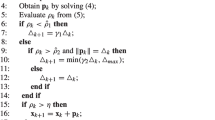Abstract
Boosting algorithms, a well-studied and effective machine learning technology, iteratively combines the output of weak learners to produce a powerful predictive model with performances improved over the single weak learner. Accelerated proximal boosting machine (APBM) is a boosting algorithm built upon the proximal point algorithm and employed Nesterov’s accelerated descent. However, in the acceleration process, the momentum term will accumulate errors, which may cause the algorithm to diverge. In this paper, we propose a new algorithm named CAPBM, which incorporates corrected pseudo residual into the design of APBM in boosting process. By applying the corrected pseudo residual to update the momentum sequence, CAPBM can reduce the error generated when fitting the residual, and further ensure the algorithm convergence. Finally, we theoretically prove that CAPBM is convergent with a rate of \(O(1/t^2)\). Numerical experiments on real datasets are carried out to illustrate that the proposed CAPBM algorithm is effective and competitive.



Similar content being viewed by others
References
Schapire, R.E.: The strength of weak learnability. Mach. Learn. 5(2), 197–227 (1990)
Freund, Y.: Boosting a weak learning algorithm by majority. Inf. Comput. 121(2), 256–285 (1995)
Freund, Y., Schapire, R.E.: Experiments with a new boosting algorithm. ICML 96, 148–156 (1996)
Freund, Y., Schapire, R.E.: A decision-theoretic generalization of on-line learning and an application to boosting. J. Comput. Syst. Sci. 55(1), 119–139 (1997)
Breiman, L.: Arcing the edge, Technical report, Technical Report 486. University of California, Statistics Department (1997)
Breiman, L.: Arcing classifier (with discussion and a rejoinder by the author). Ann. Stat. 26(3), 801–849 (1998)
Breiman, L.: Prediction games and arcing algorithms. Neural Comput. 11(7), 1493–1517 (1999)
Breiman, L.: Some infinity theory for predictor ensembles, Technical Report, Technical Report 579. Statistics Dept, UCB (2000)
Breiman, L.: Population theory for boosting ensembles. Ann. Stat. 32(1), 1–11 (2004)
Friedman, J.H., Hastie, T., Tibshirani, R., et al.: Additive logistic regression: a statistical view of boosting (with discussion and a rejoinder by the authors). Ann. Stat. 28(2), 337–407 (2000)
Friedman, J.H.: Greedy function approximation: a gradient boosting machine. Ann. Stat. pp. 1189-1232 (2001)
Friedman, J.H.: Stochastic gradient boosting. Comput. Stat. Data Anal. 38(4), 367–378 (2002)
Pedregosa, F., Varoquaux, G., Gramfort, A., Michel, V., Thirion, B., Grisel, O., Blondel, M., Prettenhofer, P., Weiss, R., Dubourg, V., et al.: Scikit-learn: machine learning in python. J. Mach. Learn. Res. 12, 2825–2830 (2011)
Meng, X., Bradley, J., Yavuz, B., Sparks, E., Venkataraman, S., Liu, D., Freeman, J., Tsai, D.B., Amde, M., Owen, S., et al.: Mllib: machine learning in apache spark. J. Mach. Learn. Res. 17(1), 1235–1241 (2016)
Chen, T., Guestrin, C.: Xgboost: A scalable tree boosting system. In: Proceedings of the 22nd ACM Sigkdd International Conference on Knowledge Discovery and Data Mining, pp. 785–794 (2016)
Ke, G. Meng, Q. Finley, T., Wang, T., Chen, W., Ma, W., Ye, Q., Liu, T.-Y.: Lightgbm: A highly efficient gradient boosting decision tree. Adv. Neural Inf. Process. Syst., 3146–3154 (2017)
Ponomareva, N., Radpour, S., Hendry, G., Haykal, S., Colthurst, T., Mitrichev, P., Grushetsky, A.: Tf boosted trees: a scalable tensorflow based framework for gradient boosting. In: Joint European Conference on Machine Learning and Knowledge Discovery in Databases, Springer, pp. 423–427 (2017)
Wang, K., Wang, Y., Zhao, Q., Meng, D., Liao, X., Zongben, X.: Splboost: an improved robust boosting algorithm based on self-paced learning. IEEE Trans. Cybern. 51(3), 1556–1570 (2019)
Mason, L., Baxter, J., Bartlett, P., Frean, M.: Boosting algorithms as gradient descent. Adv. Neural Inf. Process. Syst. 12, 512–518 (1999)
Collins, M., Schapire, R.E., Singer, Y.: Logistic regression, AdaBoost and Bregman distances. Mach. Learn. 48(1–3), 253–285 (2002)
Bickel, P.J., Ritov, Y., Zakai, A.: Some theory for generalized boosting algorithms. J. Mach. Learn. Res. 7(5), 705–732 (2006)
Telgarsky, M.: A primal-dual convergence analysis of boosting. J. Mach. Learn. Res. 13(1), 561–606 (2012)
Haihao, L., Mazumder, R.: Randomized gradient boosting machine. SIAM J. Optim. 30(4), 2780–2808 (2020)
Wang, C., Wang, Y., Schapire, R. et al.: Functional Frank–Wolfe boosting for general loss functions. arXiv preprint arXiv:1510.02558 (2015)
Biau, G., Cadre, B., Rouvíére, L.: Accelerated gradient boosting. Mach. Learn. 108(6), 971–992 (2019)
Lu, H., Karimireddy, S.P., Ponomareva, N., Mirrokni, V.: Accelerating gradient boosting machines. In: International Conference on Artificial Intelligence and Statistics, pp. 516–526 (2020)
Fouillen, E., Boyer, C., Sangnier, M.: Proximal boosting and its acceleration. arXiv-1808 (2018)
Nesterov, Y.E.: Introductory Lectures on Convex Optimization: A Basic Course. Kluwer Academic Publishers, Dordrech (2004)
Tseng, P.: On accelerated proximal gradient methods for convex-concave optimization. University of Washington, Tech. Rep. (2008)
Parikh, N., Boyd, S.: Proximal algorithms. Found. Trends Optim. 1(3), 127–239 (2014)
Bühlmann, P., Bin, Yu.: Boosting with the l2 loss: regression and classification. J. Am. Stat. Assoc. 98(462), 324–339 (2003)
Zhang, T., Bin, Yu., et al.: Boosting with early stopping: convergence and consistency. Ann. Stat. 33(4), 1538–1579 (2005)
Bartlett, P.L., Traskin, M.: Adaboost is consistent. J. Mach. Learn. Res. 8(10), 2347–2368 (2007)
Acknowledgements
The authors are indebted to the editors and anonymous referees for their a number of helpful comments and suggestions that improved the quality of this manuscript.
Author information
Authors and Affiliations
Corresponding author
Additional information
Publisher's Note
Springer Nature remains neutral with regard to jurisdictional claims in published maps and institutional affiliations.
This work was supported by Research Project Foundation of Shanxi Scholarship Council of China (No.2017-104)
Rights and permissions
About this article
Cite this article
Li, J., Wang, F., Zhen, N. et al. A new accelerated proximal boosting machine with convergence rate \(O(1/t^2)\). J. Appl. Math. Comput. 68, 3747–3766 (2022). https://doi.org/10.1007/s12190-021-01684-w
Received:
Revised:
Accepted:
Published:
Issue Date:
DOI: https://doi.org/10.1007/s12190-021-01684-w
Keywords
- Proximal boosting algorithm
- Corrected pseudo residual
- Convergence rate
- Momentum sequence
- Boosting machine




